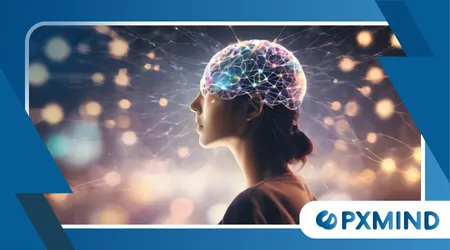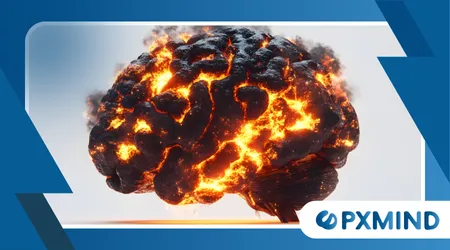Come il cervello gestisce il sovraccarico di informazioni

L'incessante flusso di dati nel nostro mondo iperconnesso ci costringe a chiederci: come funziona il cervello gestisce il sovraccarico di informazioni senza crollare?
Annunci
Viviamo in una vera e propria pentola a pressione cognitiva, che richiede una comprensione più profonda della nostra architettura neurale.
Questo massiccio flusso di input mette in discussione l'essenza stessa dell'attenzione umana e della funzione esecutiva, creando nuovi percorsi di stress.
Come fa il cervello umano a filtrare il flusso costante di dati digitali?
Il nostro cervello impiega un sofisticato meccanismo di attenzione selettiva, che funge da barriera essenziale contro lo tsunami informativo.
Questo triage cognitivo determina quali dei miliardi di bit sensoriali in arrivo al secondo entrano effettivamente nell'elaborazione cosciente.
Solo circa 10-50 bit di informazioni al secondo riescono a superare questo stretto collo di bottiglia e a influenzare il nostro processo decisionale.
La corteccia prefrontale, sede delle funzioni esecutive, coordina questo filtraggio, dando priorità alla pertinenza e sopprimendo le distrazioni.
Perché il multitasking è un'illusione che esaurisce le nostre risorse cognitive? Il cervello gestisce il sovraccarico di informazioni
Il termine "multitasking" è profondamente improprio nel contesto delle scienze cognitive: il nostro cervello non è predisposto per l'elaborazione simultanea e approfondita di più compiti complessi.
Invece, ci impegniamo in una rapida cambio di attività, il che aumenta drasticamente il nostro carico cognitivo e il dispendio energetico.
Ogni cambiamento richiede al cervello di riorientare e riattivare le reti neurali associate a un compito, un processo metabolicamente costoso.
Leggi qui: Il cervello degli adolescenti: perché è predisposto al rischio
Questo continuo cambiamento esaurisce rapidamente il glucosio ossigenato, la principale fonte di energia del cervello, provocando affaticamento e scarse prestazioni.
Quali specifici meccanismi neurali consentono l'attenzione selettiva?
L'attenzione selettiva non è un semplice interruttore on/off; è un'interazione dinamica tra varie regioni del cervello.
Il talamo, una stazione di ritrasmissione critica, inibisce attivamente la trasmissione di segnali sensoriali irrilevanti alla corteccia cerebrale.
Il neurotrasmettitore GABA svolge un ruolo fondamentale in questo processo, riducendo sostanzialmente il “volume” dei flussi di informazioni non essenziali.
Questa coreografia neurale garantisce che solo le informazioni prioritarie ricevano l'elaborazione ad alta larghezza di banda di cui hanno bisogno.
Cosa succede alla qualità del processo decisionale in condizioni di elevato carico informativo?
L'eccesso cronico di informazioni degrada profondamente la qualità dei nostri giudizi e delle nostre decisioni.
Quando il carico cognitivo supera la capacità del cervello, gli individui spesso ricorrono a scorciatoie mentali o sperimentano una "paralisi informativa".
Guarda quanto è interessante: Cosa dice la neuroscienza sulla creatività
Questo stato, caratterizzato dall'incapacità di elaborare e agire sui dati disponibili, si traduce in scelte ritardate o sbagliate.
È fondamentale comprendere questo fenomeno, poiché l'esaurimento delle risorse mentali dovuto alla gestione di piccole decisioni può compromettere la nostra capacità di gestire quelle più importanti.

In che modo il sovraccarico cronico influisce sulla salute cerebrale e sulla creatività a lungo termine?
L'esposizione prolungata a un volume eccessivo di informazioni può avere effetti negativi misurabili sul benessere mentale e sulla produzione creativa.
Gli ormoni dello stress associati a questa pressione cronica possono alterare la funzionalità della rete neurale, compromettendo la memoria e la concentrazione.
Guarda qui: Ridefinire la produttività per un migliore equilibrio mentale
Gli studi indicano un legame diretto tra questo stato costante di "cervello occupato" e l'erosione della capacità creativa.
Quando il cervello è concentrato sull'elaborazione, ha meno risorse residue per formare connessioni nuove e originali, soffocando il pensiero innovativo.
Ecco uno sguardo all'impatto documentato del sovraccarico di informazioni:
| Dominio dei sintomi | Impatto |
| Cognitivo | Riduzione della concentrazione sostenuta, scarsa qualità decisionale, compromissione della memoria. |
| Emotivo | Aumento di stress, ansia, stanchezza digitale, senso di sopraffazione. |
| Comportamentale | Cambio di attività, procrastinazione, controllo compulsivo dei dispositivi. |
| Fisico | Disturbi del sonno, affaticamento mentale, manifestazioni fisiche di stress. |
Possiamo imparare a gestire proattivamente il carico cognitivo? Il cervello gestisce il sovraccarico di informazioni
Assolutamente sì, e la chiave sta nel riconoscere i limiti fissi di elaborazione del cervello, un concetto fondamentale della teoria del carico cognitivo.
Questa teoria postula che il cervello abbia risorse limitate, che devono essere gestite con attenzione.
Possiamo impiegare tecniche per ridurre il cervello gestisce il sovraccarico di informazioni meglio rendendo le informazioni “meno complesse” da elaborare per il cervello.
Consideriamo l'analogia di un filtro da caffè di alta qualità: il tuo cervello è il filtro.
Se ci versi dentro un gallone di acqua fangosa (informazioni) tutta in una volta, il filtro si intasa, il flusso si interrompe e quel poco che passa è sporco.
Tuttavia, se si versa la stessa quantità lentamente, in piccoli lotti filtrati, l'acqua pulita scorre in modo costante. Questo dimostra la potenza di suddivisione in blocchi E lavoro mirato.
La posta in arrivo curata: Invece di lasciare l'applicazione di posta elettronica in esecuzione continua, una persona imposta tre intervalli specifici di 15 minuti durante il giorno per elaborare la posta elettronica.
Creando un confine fisico e mentale, interrompono il flusso continuo che frammenta l'attenzione.
La ripartizione del progetto: Un project manager riduce un compito ampio e complesso in cinque sotto-attività più piccole, interdipendenti tra loro in sequenza.
Ciò riduce significativamente il carico cognitivo immediato, eliminando la necessità di mantenere simultaneamente l'intera struttura del progetto nella memoria di lavoro.

Cosa ci dicono le ricerche più recenti sulle nostre abitudini informative nel 2025?
Uno studio fondamentale del 2025 dell'Università di Birmingham ha rivelato un fattore ambientale inaspettato: anche i più piccoli inquinanti dell'aria interna possono influire negativamente sulla nostra attenzione selettiva.
I partecipanti allo studio hanno avuto maggiori difficoltà di concentrazione quando sono stati esposti a bassi livelli di inquinanti.
Ciò sottolinea i modi sottili e spesso trascurati in cui l'ambiente influisce sulla nostra resilienza cognitiva al sovraccarico.
Inoltre, la ricerca sulla metacognizione suggerisce una diffusa falsa credenza: le persone tendono a smettere di ricevere nuove informazioni troppo presto, credendo erroneamente di aver massimizzato il ricordo, quando le prestazioni assolute sono spesso più elevate con elenchi più lunghi e strutturati.
Crediamo davvero che aggiornare costantemente il feed di notizie ci renda più informati o semplicemente più ansiosi?
Domande frequenti
Qual è la differenza fondamentale tra Sovraccarico cognitivo E Sovraccarico di informazioni?
Il sovraccarico di informazioni è l' ingresso—riceve troppi dati.
Il sovraccarico cognitivo è il produzione—lo stato risultante in cui le risorse di elaborazione del cervello (memoria di lavoro) vengono superate, con conseguente compromissione delle funzioni.
Il “Doomscrolling” ha una base scientifica?
Sì, è spesso collegato al cervello pregiudizio di negatività, un tratto evolutivo che porta gli esseri umani a prestare maggiore attenzione alle potenziali minacce (informazioni negative) perché hanno un impatto percepito maggiore sulla sopravvivenza.
È possibile migliorare la capacità del cervello di gestire più informazioni?
Mentre la larghezza di banda di elaborazione fondamentale è relativamente fissa, efficienza La capacità di elaborazione può essere migliorata attraverso l'allenamento alla consapevolezza, pratiche di "lavoro profondo" e strategie organizzative come il "brain dumping" per esternalizzare e categorizzare i pensieri.
++ Gli effetti neurologici del multitasking cronico e del sovraccarico digitale
++ Cause, conseguenze e strategie per affrontare il sovraccarico di informazioni
